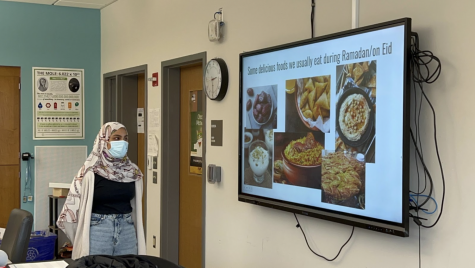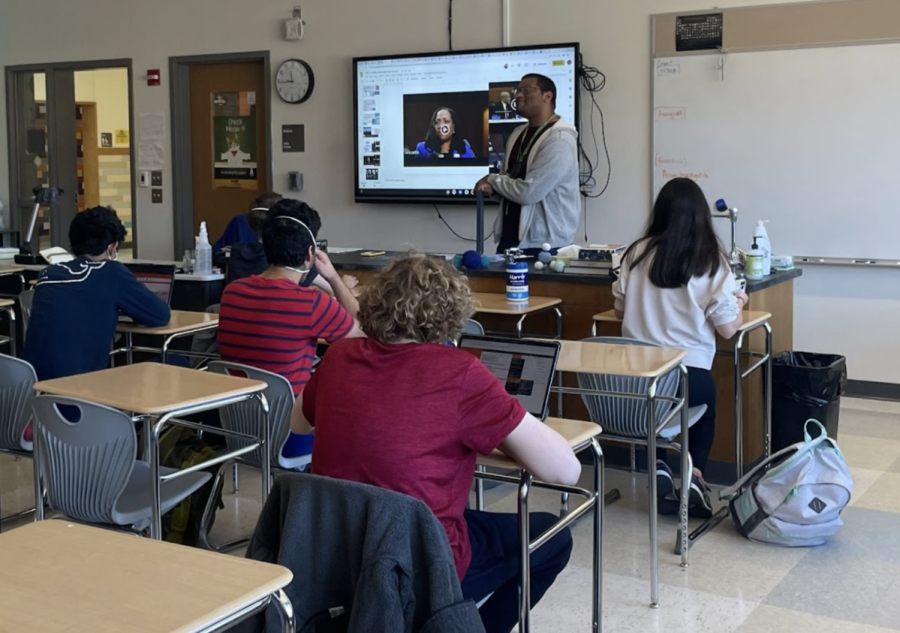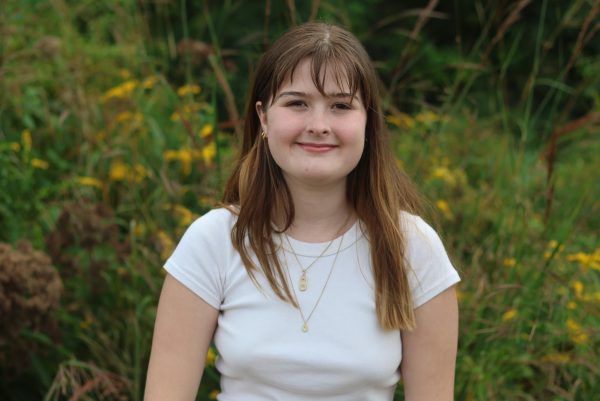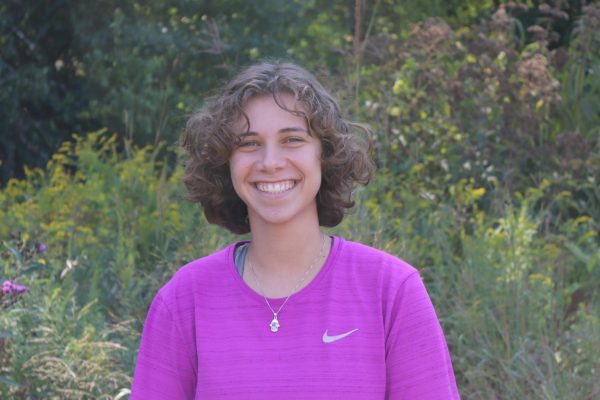Courtland Ferreria-Douglas: The importance of diversity and identities within the classroom
Credit: Aimee Smith
In the first few minutes of class, chemistry teacher Courtland Ferreria-Douglas takes the time to educate students on the newly nominated Supreme Court Justice Ketanji Brown Jackson. The video Ferreria-Douglas shared with his class highlights the importance of Jackson being the first African-American woman nominated to the Supreme Court.
May 10, 2022
Students slip into their seats, looking towards the board of their chemistry classroom excitedly. However, most of them aren’t excited to learn the new chemical equations. Instead, they’re looking forward to the first ten minutes of class, where they’ll take the time to learn about important cultural figures or events.
According to tenth-grade chemistry teacher Courtland Ferreria-Douglas, taking the time to educate students about relevant cultural information isn’t disrupting class time, but instead it encourages a safe learning community for students of all backgrounds. Not only does Ferreria-Douglas create safe spaces for students within his classroom by embracing their unique histories, but he also establishes a safe place for students to do self-exploration in his journaling and identity club.
Although it is Ferreria-Douglas’s first year teaching at Wayland High School, he has already made great changes within the school community by teaching students to embrace their classmates’ diversity. Sharing cultural videos and ideas with students is something that Ferreria-Douglas has done for five out of his seven years teaching, but the idea stems even earlier from his own school experiences.
“I’m not so sure [any of my past teachers] fulfilled the cultural part that I wanted,” Ferreria-Douglas said. “I’ve always hoped that, if I had my own opportunity, I would bring [more culture into my classes].”
By providing students with cultural content that Ferreria-Douglas missed in his own education, he helps students connect despite their differences. Ferreria-Douglas adds culture into his class by sharing short videos about historical figures, events, or current events, as well as by inviting students to share about their own culture. He wants to create a safe environment for students to share more about themselves and the culture that they grew up in.
“[Learning about different student’s cultures’] is one of my favorite parts [of class] because it helps remind me of the fact that [students] come with a lot of amazing things, most importantly new perspectives on how the world could potentially be,” Ferreria-Douglas said.
Students like sophomore Mariam Gayed have taken advantage of Ferreria-Douglas’ opportunity to share by presenting to the class about topics that are important to them. Gayed is a member of the Muslim Student Association in Wayland, and she felt that teaching her classmates about the importance of Ramadan would help them understand her more. By educating her peers on Ramadan, it creates a more inclusive and safe learning environment for both Gayed and her classmates.

“The connections [between my classmates and I] don’t always have to be super personal, but there is a certain understanding,” Gayed said. “It’s like, ‘I’ve learned this about your culture, and I enjoyed understanding it.’”
While some may be concerned that taking the time out of class to discuss important figures or events would disrupt time for learning, this is not the case. According to Ferreria-Douglas, he covers the same amount of content in a class where he takes the time to discuss relevant culture as he did before when he taught classes without it. Additionally, the culture shared in the beginning of class adds to students’ education by teaching them about the diversity around them.
“I think part of learning is not just [learning] the facts and what’s been taught for years,” Gayed said. “It’s also about learning what’s going on now and what’s happening around you. So I think the cultural stuff adds on to our learning experience. Even though it might not be directly related to chemistry.”
While learning about other cultures is essential to developing your understanding of the world, Ferreria-Douglas also encourages students to learn about their identities. Every Friday in room 206, Ferreria-Douglas hosts the journaling and identity club, where students are allowed to embrace their identities by learning more about how to share their beliefs and feelings.
“[Teachers] are talking to [students], teaching them how to write papers, how to read something and translate that into words, but I don’t think we’re giving [students] enough time to really share their beliefs and thoughts unhindered or without judgment,” Ferreria-Douglas said.
In addition to students becoming more comfortable within themselves, the club also gives students the opportunity to create more connections in the classroom. Because club meetings are a time for students to authentically express themselves, it helps create a safe relationship back in the classroom because the club members took the time to be vulnerable with each other and learn more about their peers beyond anything superficial.
“The club activities help build new connections with your teachers,” Gayed said. “I think that’s something that people should learn to do, because I think it helps you in that class in general because you feel more comfortable going to the teacher if you’re struggling with work, or if you need help with something. ”
To build better relationships where club members are comfortable with one another and with exploring their identities. Ferreria-Douglas incorporates fun games like ‘identity speed dating’ and a prompt jar for journaling. However, most of the meetings are time for students to relax or organize their own activities to help build a better community.
According to sophomore Joss O’Heron, her favorite club activity is ‘rose bud thorn,’ where the club members take the first few minutes of the meeting to talk and listen about one another’s weeks. By taking the time to listen to O’Heron’s peers’ thoughts and feelings, she feels that she is learning valuable lessons about her classmates and life skills in general.
“I feel like I’ve always been good at expressing my feelings,” O’Heron said. “So for me personally, I think that going into his club and listening to other people’s problems, especially around school is important. These are people who I’ve known since kindergarten, but I’ve never had an actual conversation with, so I feel like [listening to them] is a really good learning opportunity.”
While some of the club activities help students develop listening skills, others are more focused on self-reflection. For Ferreria-Douglas, one of the activities that helped him most is journaling. He uses the club to encourage students to write down their feelings and thoughts to better their understanding of themselves.
“The first thing I realized from journaling was that I didn’t respect my own thoughts enough,” Ferreria-Douglas said. “It wasn’t until I started to write my thoughts down, that I really started to understand who I was as a person.”
Being given the chance to listen and have your feelings be taken seriously within the club has helped with confidence within the classroom.
“In class, I’m not great at raising my hand and asking questions,” O’Heron said. “In the identity and journaling club, you get used to speaking your opinion, listening to others and then having real conversations. So I feel like I take those skills, and I do that in class. Like, if I have a good question in class, I’ve been raising my hand or asking the people around me for help a lot more than I was before [joining the journaling and identity club].”
Gaining confidence is only possible once someone understands and accepts themselves on a deeper level. With confidence in our identities, we can appreciate the differences that make everyone unique.
“When we think about identity, I think it’s important to be able to find yourself more than anything,” Ferreria-Douglas said. “It’s the venture of life so I hope all students can find that at some point in their life.”
By creating a safe place for students to express their thoughts, concerns or anything else on their mind, Ferreria-Douglas has expanded his students’ learning potential for all things chemistry and life in general.
“I think a lot of people go to class and know who is in their class, but don’t really know their classmates [as individuals],” Ferreria-Douglas said. “One of the things I hope to stress to [students] is that it’s important to get to know [everyone]. Maybe not everyone in a deep manner, but we have to make sure that everyone is represented in a different way.”





![Last Wednesday, the Wayland School Committee gathered to discuss a number of topics regarding the health curriculum and Innovation Career Pathway course. Another large topic of conversation was the ways to potentially mitigate distracting cell phone usage. "These [phones] are going to distract your learning and social relationships," Superintendent David Fleishman said. "That's concrete right there."](https://waylandstudentpress.com/wp-content/uploads/2025/06/Screenshot-2025-06-04-at-9.49.31 PM-1200x886.png)



























![Troy Hoyt finishes the Boston Marathon, running for the Hoyt Foundation. T. Hoyt is the son of Hoyt Foundation CEO Russ Hoyt.
“[Running a marathon] might seem like a big thing, when it’s presented to you at first, but if you break it up and just keep telling yourself, “Yes, you can,” you can start chipping away at it. And before you know it, you’ll be running the whole 26 miles, and you won’t even think twice about it.” T. Hoyt said.](https://waylandstudentpress.com/wp-content/uploads/2025/04/C36E8761-1CBB-452E-9DF2-543EF7B1095E_1_105_c.jpeg)














































